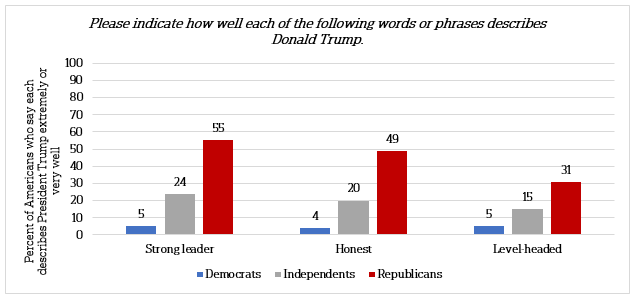
Few Americans believe that President Trump understands their needs and problems, and most would not describe him as honest, level-headed, or a strong leader, according to a new poll by The Associated Press-NORC Center for Public Affairs Research.
Nineteen percent of Americans say President Trump understands the needs and problems of people like them extremely or very well, 17 percent say moderately well, and 64 percent say he understands their needs and problems not very well or not well at all.
Twenty-six percent believe President Trump is a strong leader, 23 percent view him as honest, and 16 percent say he is level-headed. Republicans are most likely to use each of these terms to describe the president.

Presidential approval remains on a downward trend. Thirty-two percent of Americans say they approve of the way President Trump is handling his job and 67 percent disapprove. His approval rating is down from 42 percent in March and 35 percent in June. While 67 percent of Republicans still approve of the job the president is doing, support among Republicans has decreased significantly since March when 80 percent of Republicans expressed approval. Twenty-eight percent of independents and 5 percent of Democrats say they approve of Trump’s handling of his job. Among Democrats, this also represents a decline since March when 11 percent said they approved.
Congressional approval remains even lower. Eighteen percent of Americans say they approve of the way Congress has been handling its job and 81 percent disapprove, including 51 percent who say they strongly disapprove.
Few Americans express confidence in the direction the U.S. is headed. Just 24 percent of Americans say things in this country are headed in the right direction, down from 34 percent in June and 37 percent in March of this year.
The nationwide poll was conducted September 28-October 2, 2017 using the AmeriSpeak® Panel, the probability-based panel of NORC at the University of Chicago. Online and telephone interviews using landlines and cell phones were conducted with 1,150 adults. The margin of sampling error is plus or minus 4.1 percentage points.



